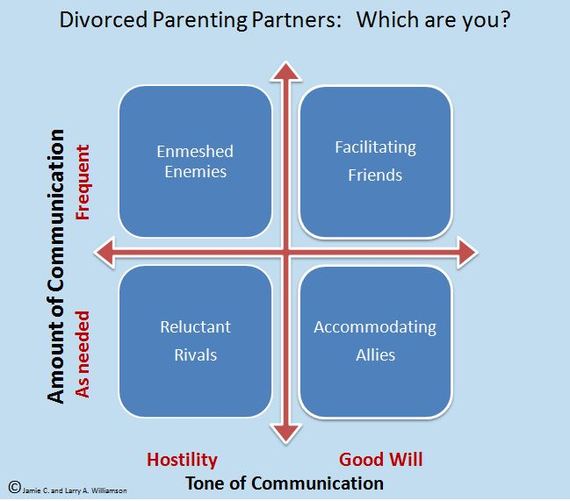Divorce should not be entered into lightly, especially if you are a parent. Marriages may dissolve. But, co-parenting is truly a "to death do us part" commitment, including all of the family life events in between. Parents must choose (and it is a choice) whether they will have a friendly divorce or an acrimonious one. The decision has a lasting impact on the parents, and especially their children.
This obvious reality may come as a shock to even the best parents who are wrapped up in the early stages of divorce. Parents contemplating divorce or dealing with the emotional, psychological and financial aspects of divorce often require a reminder that for children to become well-adjusted emotionally and psychologically, they need a safe, secure, and happy family environment. They need their parents to be partners, to like each other... to be friends at best and, at least, to peacefully co-exist. And, they need this, whether their parents stay married or not.
Last week I helped a couple work out a Parenting Plan that included 50% time-sharing. To their credit, they understood that their son needed the love and care of both of his capable parents. Yet, several times during the mediation their conversation regressed into bickering, judgmental comments, petty accusations, and raised voices. Their mediation session likely represented the destructive communication patterns that led to their divorce. It was exhausting for me after about a half an hour. I couldn't imagine how debilitating it would be for them (and their son) if they kept it up for a life time.
As the facilitator, I reminded them of the rules of civility we agreed to at the outset of mediation. And, I suggested that mediation was a good and safe place to start learning a new way to interact with each other. I explained that they were no longer hostages to their old emotions or patterns of interaction and that they could build an entirely new relationship based on their mutual love for their child and their interest in building a stable future for him and for themselves. To do so, they had to agree to be both physically and emotionally divorced so they could focus on the future, not the past.
Sounds easy, right? Why didn't they know this already, right?
They did know what they needed to do to be good, supportive parenting partners. But, as the mother said, while she wiped away her tears, "We want to have a friendly divorce, we just don't know how... it's like we can't stop ourselves... it's just who we are now... what choice do we have?"
So, I clarified their basic choice to be friendly or acrimonious and the likely impact of this choice on their child. My hope was to use the mediation process to help them along the path to a better parenting partnership and a better post-divorce family life for their son.
I explained that divorce brings out the "crazy" in the best of us and encouraged them to be gentle with themselves and forgiving of each other.
Then, I complimented them on wanting to have a friendly divorce. Or, one that Dr. Constance Ahrons once described as a "good divorce" where "couples part without destroying the lives of those they love. Their children continue to have two parents. The divorced parents continue to have a good relationship with their children. The families of these good divorces continue to be just that -- families."
In the mid-1990s, as a counseling psychologist, Dr. Ahrons identified four types of divorced parents ranging from caring and supportive friends, to hostile and bitter foes: Perfect Pals, Cooperative Colleagues, Angry Associates, and Fiery Foes. A fifth type, Dissolved Duos, discontinue contact with each other altogether.
As a social psychologist specializing in interpersonal communication and working as a family mediator, I approach the work of identifying types of divorced parenting partners a bit differently because my job is not to psycho-analyze the divorcing couples. Instead, I provide couples a tool kit for handling conflict, a safe place to learn new ways to communicate with each other, and I help them resolve their issues amicably, reach mutual agreement on their current family issues, and direct their focus on building a stable future, rather than be stuck rehashing the past.
I encourage couples to focus on the expected frequency of their contact and tone of their interaction, both with one another and in front of their children. And, I asked them some questions to help them decide for themselves how to begin building a friendly post-divorce parenting relationship.
1. Given the age of your children, how often will the two of you need to communicate in order to coordinate shared parenting now, and as your children grow older? How willing are you to let hostile communication with each other impact your children's development and detract from your ability to build a stable and happy future for yourself?
2. Given the holidays, extended-family events, your children's birthday, school and extra-curricular activities, how often will you both be in the same public place at the same time now, and as your children come of age? How willing are you to let the distress associated with seeing one another detract from your and especially your children's ability to enjoy school and extra-curricular activities?
3. As married parents, how often did you show negative feelings toward each other in front of your children? How did you feel about it on those occasions that you did show negative feelings toward each other in front of your children? How did your children react?
4. Did you try to refrain from displaying hostility with each other in front of the children because you were married or because you didn't want to upset your children? Why would your motivation change now that you are divorcing?
5. On the Divorced Parenting Partnership diagram, which type of divorced parenting would characterize your current co-parenting relationship?
6. Which type of divorced parenting do you believe will support the physical, social, intellectual, and spiritual well-being of your children?
7. What do you have to change about the frequency and tone of your interaction in order to become that type of divorced parenting team? How might your co-parenting style naturally change as your children come of age?
If you are contemplating divorce, I encourage you to talk through these questions seriously with your parenting partner. Decide what type of Parenting Partnership supports your children's social, emotional, and intellectual well-being and invest the effort to get past your anger and "work it out".
And let me know if I can help: Jamie@amitymediationworkshop.com

